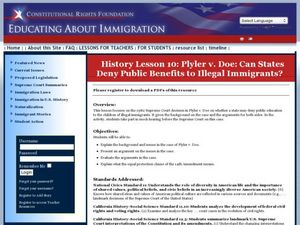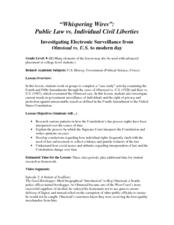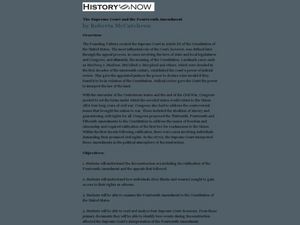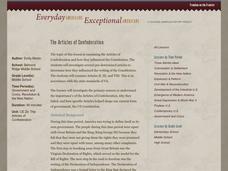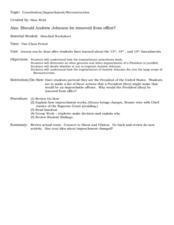Curated OER
History Lesson 10: Plyler v. Doe: Can States Deny Public Benefits to Illegal Immigrants?
Students consider the rights of illegal immigrants. In this illegal immigration lesson, students analyze the Supreme Court case Plyler v. Doe and determine whether illegal immigrants should have access to public benefits. Students...
Curated OER
Teaching With Documents Lesson Plan: Images of the American Revolution
Students interpret historical evidence presented in primary and secondary resources. In this American Revolution lesson, students examine international involvement in the war as well as major events of the war.
Curated OER
Teaching With Documents Lesson Plan: Photographs of Lewis Hine: Documentation of Child Labor
Students interpret historical evidence presented in primary and secondary resources. In this child labor instructional activity, students examine photograhs by Lewis Hines and discuss the implications of child labor in America.
Curated OER
"Whispering Wires": Public Law vs. Individual Civil Liberties
High school student love discussing controversial issues like those brought up in this fourth amendment case study. They examine the 1928 Olmstead vs. U.S. prohibition court case, applying the fourth amendment to determine whether or not...
Curated OER
How was the Constitution Used to Organize the New Government?
How did the United States Congress determine how the new president and vice president would be named when the nation was first established? Who would provide money for the government, and how would the executive branch be organized?
Curated OER
Role Playing Free Speech
Students conduct research into looking at a free-speech issue. They role play the events surrounding a court case. The lesson includes guiding questions to help create context and determine areas of further study. The presentation...
Curated OER
Symbolic Speech
Ninth graders consider the right of freedom of speech as it is outlined in the U.S. Constitution. They receive background information for the US Supreme Court, the Bill of Rights, and free speech. They discuss a series of actual cases...
Curated OER
The Ongoing Debate: Crime Control v. Due Process Protection
Young scholars investigate the Exclusionary Rule and other ways of to enforce the protections found in the Bill of Rights. They study how effective criminal control and public safety is carried out while citizens Constitutional rights...
Curated OER
Ohio Statehouse History
Fourth graders examine the history of the Ohio Statehouse and order the major historical events in its development. The instructional activity traces the development from the time of Ohio's vast wilderness to the house's completion in 1861.
Curated OER
The Supreme Court and the Fourteenth Amendment
Students examine the ratification of the Fourteenth Amendment. For this Reconstruction Era lesson, students read and analyze 4 Supreme Court decisions regarding the Fourteenth Amendment and determine how the decisions impacted citizen...
Curated OER
Free to Speak and Free to Post?
Students research on the Web and in books with city statutes or call city officials to find out the local ordinance on posting signs on utility poles. If illegal, students explore what has happened elsewhere when citizens decided to...
Curated OER
World can't wait, students say
Learners create a lesson to present to the rest of the class about current laws, including expressing killing the president as a joke. Students research past events and current laws. Learners present to the class using mult-media, oral...
Roy Rosenzweig Center for History and New Media
The Articles of Confederation
Have you ever started a project only to realize you need to scrap it and start over? Scholars analyze the issues leading to the fall of the Articles of Confederation. A group investigation into Articles II, III, and VIII unveil the...
Benjamin Franklin Tercentenary
Benjamin Franklin: Master Diplomat for One Last Time
At 81, Benjamin Franklin was the oldest delegate to the 1787 Constitutional Convention, where he exercised significant influence in shaping key elements of how the United States operates. The class examines his role, using “The Scene at...
State Bar of Texas
Engel v. Vitale
Can you bow your head and pray in school? Scholars investigate the issue of school prayer with the Supreme Court case Engel v. Vitale. A short video clip along with paired group work helps viewers form opinions on the matter. They answer...
State Bar of Texas
Miranda v. Arizona
You have the right to remain silent—but why? Scholars analyze the nature of what has become known as the Miranda Rights. A short video along with paired group work and discussion opens the issue of the rights of the accused upon arrest....
Curated OER
Concept Formation Lesson Plan: Understanding "Protest"
After analyzing both examples and non-examples of a variety of protests conducted by ethnic groups in Seattle and the state of Washington during the twentieth century, your class members will work to identify the key ideas and components...
State Bar of Texas
Mapp v. Ohio
Do you have a search warrant? Scholars investigate the concept of illegal search and seizure through the eyes of the Supreme Court case Mapp v. Ohio. A short video clip along with paired group work opens discussion on the concept of how...
K20 LEARN
Electoral College: Does My Vote Count?
How can a candidate get the most votes, yet still lose the race for the presidency? This is has happened more than once in American history, including in the elections of 2000 and 2016. Using an activity for creating group notes, young...
Curated OER
Constitution/Impeachment/Reconstruction
Eleventh graders analyze a chart comparing U.S. census data from 1850, 1880, 1900, and 1920. They read a handout summarizing immigration legislation from 1882-1996 and create a graph charting how open / closed U.S. immigration is over time.
National Endowment for the Humanities
Oyez! Oyez! Oyez!: Simulating the Supreme Court
Students have freedom of speech—or do they? Using an actual court case and research materials on the Supreme Court, young legal scholars examine the Supreme Court's role and history. Then, they argue a case the court declined to hear and...
State Bar of Texas
McCullough v. Maryland
Can a state government tax the federal government? The Supreme Court case McCullough v. Maryland explores different governments in the United States. Scholars research the court's decision with a video and discussion. They formulate...
Curated OER
Post-1865: Effects of the War
An engaging lesson plan focuses on the impact of the war and Lincoln's plan for Reconstruction had on the United States. Historians analyze primary documents, such as Constitutional Amendments and newspaper experts. They also participate...
Museum of the American Revolution
Hamilton Was Here: Rising Up in Revolutionary Philadelphia
Hamilton may be a hit Broadway show, but there is so much more to learn. An eight-unit resource guides young historians through the life of Alexander Hamilton and the Revolutionary War. The lessons include hands-on-activities, writing,...


